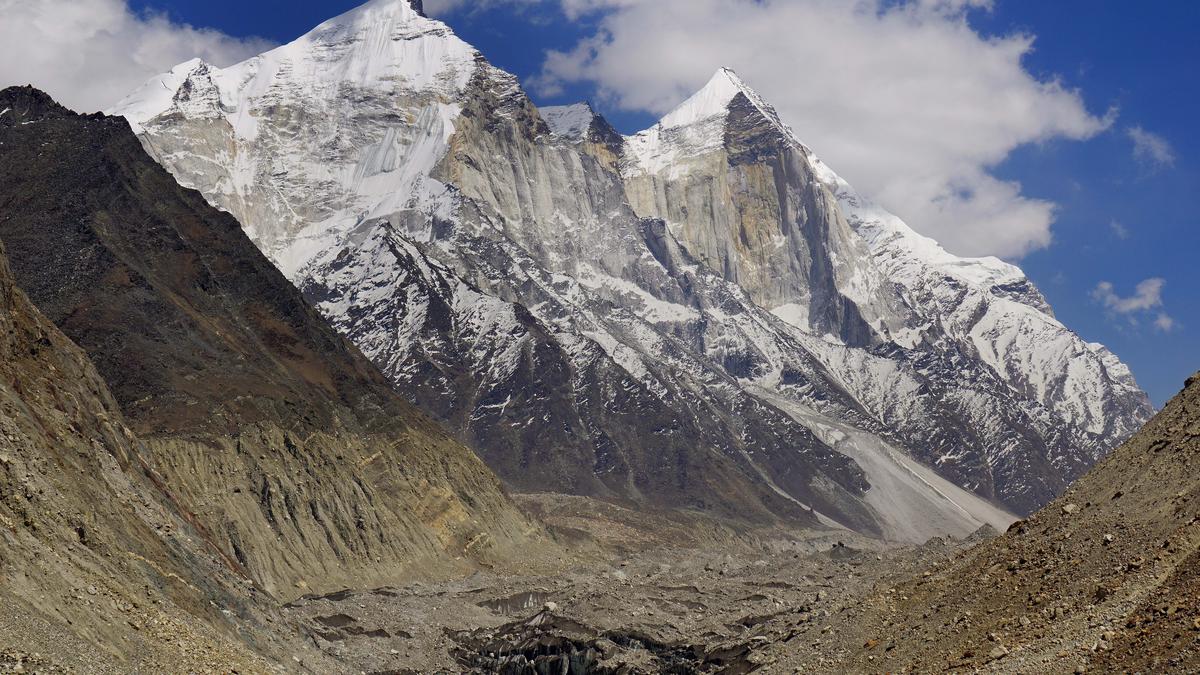India's Gangotri Glacier Losing Snow, Affecting Local Ecosystem
Science & Technology SciencePosted by AI on 2025-08-30 22:38:37 | Last Updated by AI on 2025-08-31 11:42:57
Share: Facebook | Twitter | Whatsapp | Linkedin Visits: 0

Despite arriving at its peak with a solid blanket of snow this year, the Gangotri glacier is melting earlier than usual, impacting the local ecosystem and water cycle.
It's peak winter, but the towering peaks of India's Himalayas are still speckled with snow. Despite these picturesque conditions, the country's melting glaciers are sending out stark warnings. One of them is the Gangotri glacier, the origin of the sacred Ganges river. It's experiencing an abrupt melt this year compared to previous years. Local authorities and scientists are concerned that this could impact the local ecosystem and water cycle.
"In December, we usually have around 10 to 15 days of snowfall. This year, there has been hardly five to six days of snowfall till now," says Shakti Singh Gharti, who heads the Namami Gange project in Uttarakhand. Due to this premature melting, the Bhagirathi river, a tributary of the Ganges, didn't freeze this year. It usually freezes around September or October, highlighting the altered patterns in the region's weather.
Environmental experts like Gharti believe climate change is responsible for this shift. "Due to the increased emissions, the glaciers are melting, and the snow is melting," he said.
The melting of glaciers is a worrying trend in India. The country has around 3,000 glaciers, and the Himalayas house some of the world's highest peaks. As these glaciers melt faster, they could potentially devastate the region's ecosystem and water supply. Therefore, cracking down on climate change and preserving the local environment is vital.
The Gangotri glacier may be far from most people's minds when they turn on the tap, but the water that flows from it supports local ecosystems and sustains local communities. Without it, the region could face a catastrophic future.
Search
Categories
- Sports
- Business
- History
- Politics
- International
- Science & Technology
- Social Issues
- Disaster Management
- Current Affairs
- Education
- Startup Business
- Startup News
- Awards
- Community Services
- Fundraising Events
- Volunteer Services
- Health Initiatives
- Innovations and Initiatives
- In News
- Banners
- Awards
- Partners
- Products
- Press Releases
- News
- Fast Check
- South
- సినిమా
- Gallery
- Sunday Chronicle
- Hyderabad Chronicle
- లైఫ్ స్టైల్
- National
- క్రైం
- ట్రెండింగ్
- జాబ్స్
- అంతర్జాతీయo
- బిజినెస్
- రాజకీయం
- బిజినెస్
- సంపాదకీయం
- నవ్య
- చిత్ర జ్యోతి
- క్రీడలు
- జాతీయం
- తెలంగాణ
- తాజా వార్తలు
- మన పార్టీ
- మన నాయకత్వం
- మన విజయాలు
- డౌన్లోడ్స్
- మీడియా వనరులు
- కార్యకర్తలు
- North East Skill Center News
- Government Schemes
- Entrepreneurship Support
- Employment Opportunities
- Skill Training Programs
- Departments
- Investments
- Initiatives
- Resources
- Telangana IT Parks
- Events & Jobs
- Press Releases
- News
- Airport News
- Newtons Laws of Motion
- Karbonn in Business
- Investments in Karbonn
- Company quarterly sales
- Markets
- Auto News
- Industry
- Money
- Advertisements
- Stock target
- Company Updates
- Stock Market
- Company Sales
- Staffing and HR
- Constituency Assembly
- General News
- Srikalahasti Temple
- Bojjala Sudhir Reddy
- Technology & Innovation
- Sports
- Business
- Products
- Industries
- Services & Trainings
- Tools & Resources
- Technology Integration
- Drug Seizures & Arrests
- Telangana Narcotics
- Law & Enforcement
- Rehabilitation
- Nationwide Drug Policing
- Nigeria Seizures
- Global Operations
- Drug Awareness
- Drug Enforcement Tech
- NCB Drug Seizures
- Judicial Crackdown
- India's Surveillance Tools
- Cross-Border Links
- Women Safety
- Cyber Crimes
- Drug Abuse
- Traffic & Road Safety
- Community Connect
- Public Safety Alerts
- Citizen Assistance
- Nellore City News
- Politics & Administration
- Events & Festivals
- Agriculture & Rural
- Business & Economy
- Health & Wellness
Recent News
- Telugu Politics Witness Scathing Accusations: Kotamreddy Sridhar Reddy Confronts Murder Plot, Points Finger at YSRCP Leaders
- Local Heroic Rescue in Nellore District, Andhra Pradesh
- Indian Minister Highlights Need for Secular News Education to Foster Tolerance
- Dash Cams Catch Culprits, Cut Confusion, and Cracking Crashes
- Andhra Assembly polls: TDP's Ponguru Narayana holds door-to-door campaign in Nellore
- Used To Neglect Me Over First Wife: UP Woman Murders Husband In His Sleep
- Zareen Khan Defends Ibrahim Ali Khan's Performance in Nadaaniyan: "Not His Fault" the Film Was Frivolous
- The United Nations Search: World Rural Development Day